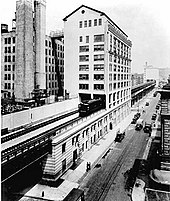Bell Laboratories Building (Manhattan)
Many early technological inventions were developed here including automatic telephone panel and crossbar switches, the first experimental talking movies (1923), black-and-white and color TV, video telephones, radar, the vacuum tube, medical equipment, the development of the phonograph record and the first commercial broadcasts, including the first broadcast of a baseball game and the New York Philharmonic with Arturo Toscanini conducting. It also served as the headquarters for the company from 1925 to the early 1960s, after which the headquarters moved to Murray Hill, New Jersey.
The site was also the home for part of the Manhattan Project during World War II.
After two years of renovations by Richard Meier, the building was reopened in 1970 as Westbeth Artists Community for low- to middle-income artists. In addition to affordable artist housing, the complex contains a theatre, an art gallery, and a synagogue.
It was declared a National Historic Landmark in 1975. The complex was listed a second time on the National Register in 2009, for its high-profile and successful example of adaptive reuse of the property.
The southern viaduct section of the West Side Line railroad passed underneath the building at first floor level. This segment remains in place but is now isolated from the rest of the former railroad viaduct, which is now the High Line elevated park.

References
- ^ "National Register Information System". National Register of Historic Places. National Park Service. January 23, 2007.
- ^ "Bell Telephone Laboratories". National Historic Landmark summary listing. National Park Service. 2007-09-08. Archived from the original on 2007-10-13.
- ^ James Sheire (March 5, 1975). "National Register of Historic Places Inventory-Nomination: Bell Telephone Laboratories" (pdf). National Park Service.
{{cite journal}}: Cite journal requires|journal=(help) - ^ ATT history

